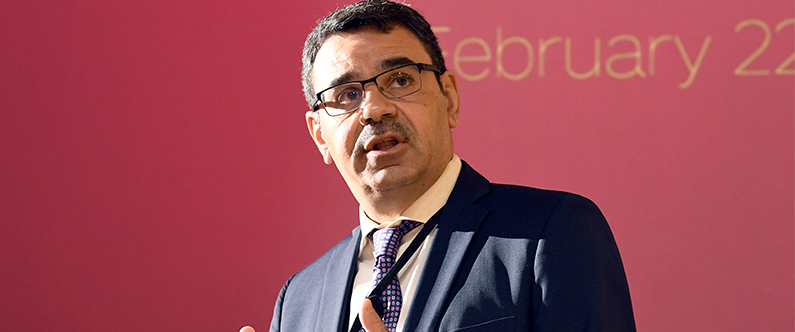A focus on research at Weill Cornell Medicine – Qatar
 Dr. Khaled Machaca, senior associate dean for research, innovation and commercialization at WCM-Q, gave an overview of the college's major research milestones.
Dr. Khaled Machaca, senior associate dean for research, innovation and commercialization at WCM-Q, gave an overview of the college's major research milestones.
The research efforts of Weill Cornell Medicine – Qatar (WCM-Q) over the past year were highlighted as the college held its 10th Research Retreat.
The annual event is an opportunity for scientists in Qatar to spend a day hearing about the work of their colleagues and about the cutting-edge studies that are conducted each year.
The Research Retreat was officially opened by Dr. Javaid Sheikh, dean of WCM-Q, followed by an overview of the major milestones WCMQ has reached on the research front presented by Dr. Khaled Machaca, senior associate dean for research, innovation and commercialization.
Dr. Sheikh said Qatar would soon be embarking on a major drive forward in research, development and innovation (RDI).
“There is going to be a road map of major elements in terms of RDI strategy within Qatar,” he said. “There will be foundational research - of which I’m very proud to say that Weill Cornell has really led the charge. There will be a spotlight on innovation and RDI talent in the country will be enhanced. There is also going to be increased emphasis on both risk capital and venture funding, and ultimately there will be a focus on RDI governance.
“Dr. Machaca and his team are already providing foundational research, producing RDI talent and accessing innovation enterprise; they really are leading the charge in biomedical research.”
 Dr. Machaca spoke of the Research Division’s many achievements since the launch of the biomedical research program just ten years ago. These include 1,182 academic publications from WCM-Q, many in high-impact journals, which have been cited 39,375 times. He also spoke of the 37 Qatari nationals who have been trained in biomedical research and have bolstered local research capacity – five of whom are employed by WCM-Q and 30 of whom are working in the biomedical sector in organizations around Qatar.
Dr. Machaca spoke of the Research Division’s many achievements since the launch of the biomedical research program just ten years ago. These include 1,182 academic publications from WCM-Q, many in high-impact journals, which have been cited 39,375 times. He also spoke of the 37 Qatari nationals who have been trained in biomedical research and have bolstered local research capacity – five of whom are employed by WCM-Q and 30 of whom are working in the biomedical sector in organizations around Qatar.
Drs. Sheikh and Machaca also acknowledged the invaluable support from both Qatar Foundation and Qatar National Research Fund for their unwavering backing over the last decade and their commitment to extending human scientific knowledge.
WCMQ recently instituted the Mariam Astrolabi Award for Biomedical Research Advancement, an award for institutions and/or individuals who have had an indelible impact on advancing the biomedical research enterprise in Qatar, in support of WCMQ efforts and mission. This year’s awardee was Dr. Asma Al-Thani, the founding dean of the College of Health Sciences at Qatar University and the founding director of Qatar University’s Biomedical Research Center (BRC).
Mariam Astrolabi after whom the award is named, was a 10th century Arab Muslim scientist who made important contributions to the development of astrolabes, which were essential navigation instruments in the day. Dr. Asma Al-Thani was recognized this year for her heroic contributions to the establishment of both the Qatar Genome Project and the Qatar BioBank. Both of these institutions have greatly benefited biomedical research and personalized medicine efforts in Qatar including researchers at WCM-Q. The award further recognizes Dr Al-Thani’s leading role in the establishment of the BRC at Qatar University.
 The Research Retreat then heard from keynote speaker Dr. Gordon Lauc, professor of biochemistry and molecular biology at the University of Zagreb, co-director of the Human Glycome Project, and the founder of Genos - a biotech company that is currently a global leader in high-throughput glycomics. Dr Lauc spoke about the importance of glycans in human health and their involvement in the future of personalized medicine.
The Research Retreat then heard from keynote speaker Dr. Gordon Lauc, professor of biochemistry and molecular biology at the University of Zagreb, co-director of the Human Glycome Project, and the founder of Genos - a biotech company that is currently a global leader in high-throughput glycomics. Dr Lauc spoke about the importance of glycans in human health and their involvement in the future of personalized medicine.
The retreat this year featured presentations from young and established researchers at WCM-Q who have built a significant portion of their career in Qatar with considerable success. This asserts the contribution to scientific capacity-building nationally and the ability of scientists to develop successful careers in Qatar. This was followed by the poster session that featured close to 100 posters from students and scientists at WCM-Q. The session was highly engaging with significant discussions. The posters were judged by scientists from various institutions in Qatar, including Hamad Bin Khalifa University, Sidra Medicine, Carnegie Mellon University in Qatar, Anti-Doping Lab Qatar, Hamad Medical Corporation, Qatar Biomedical Research Institute, Qatar University and Qatar Foundation.
The winners of the poster presentations this year are:
Category 1 – Students – Short Term
1. Zain Burney
2 Amal Abdelatif
3 Mohamed Hussine
Category 2 – Students – Long Term
1 Sabiha Khan
2 Huda Alalami
3 Fatima Al-Khawaja
Category 2 – Research Specialists
1. Ayat Hammad
2. Muneera Vakayll
3. Nayra Al-Thani
3. Manale Harfouche